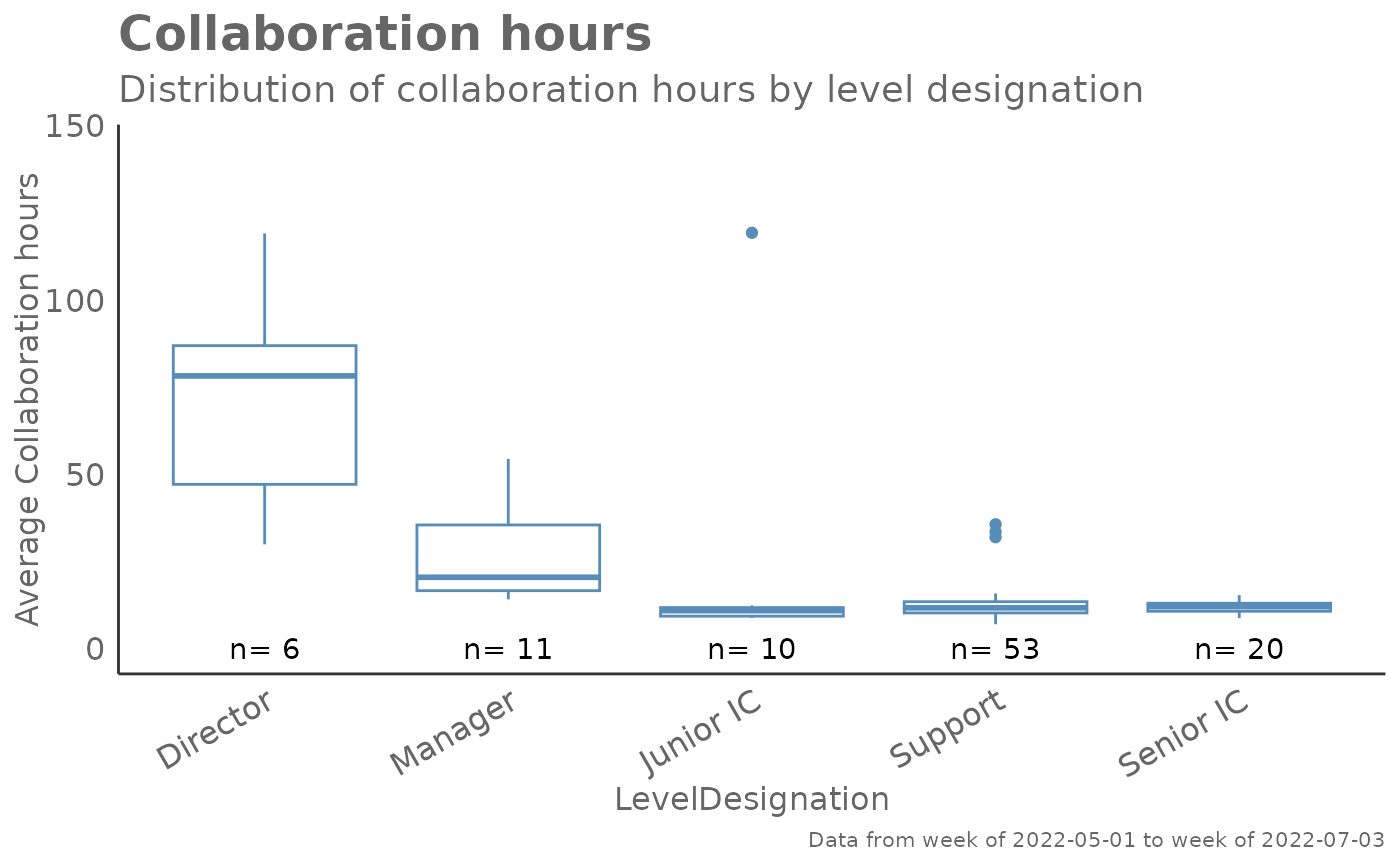Analyzes a selected metric and returns a box plot by default. Additional options available to return a table with distribution elements.
Arguments
- data
A Standard Person Query dataset in the form of a data frame.
- metric
Character string containing the name of the metric, e.g. "Collaboration_hours"
- hrvar
String containing the name of the HR Variable by which to split metrics. Defaults to
"Organization". To run the analysis on the total instead of splitting by an HR attribute, supplyNULL(without quotes).- mingroup
Numeric value setting the privacy threshold / minimum group size. Defaults to 5.
- return
String specifying what to return. This must be one of the following strings:
"plot""table""data"
See
Valuefor more information.
Value
A different output is returned depending on the value passed to the return
argument:
"plot": 'ggplot' object. A box plot for the metric."table": data frame. A summary table for the metric, containing the following columns:group: The HR variable by which the metric is split.mean: The mean of the metric.min: The minimum value of the metric.p10: The 10th percentile of the metric.p25: The 25th percentile of the metric.p50: The 50th percentile of the metric.p75: The 75th percentile of the metric.p90: The 90th percentile of the metric.max: The maximum value of the metric.sd: The standard deviation of the metric.range: The range of the metric.n: The number of observations.
"data": data frame. A data frame containing the metric and group.
Details
This is a general purpose function that powers all the functions in the package that produce box plots.
See also
Other Visualization:
afterhours_dist(),
afterhours_fizz(),
afterhours_line(),
afterhours_rank(),
afterhours_summary(),
afterhours_trend(),
collaboration_area(),
collaboration_dist(),
collaboration_fizz(),
collaboration_line(),
collaboration_rank(),
collaboration_sum(),
collaboration_trend(),
create_bar(),
create_bar_asis(),
create_bubble(),
create_dist(),
create_fizz(),
create_inc(),
create_line(),
create_line_asis(),
create_period_scatter(),
create_rank(),
create_rogers(),
create_sankey(),
create_scatter(),
create_stacked(),
create_tracking(),
create_trend(),
email_dist(),
email_fizz(),
email_line(),
email_rank(),
email_summary(),
email_trend(),
external_dist(),
external_fizz(),
external_line(),
external_rank(),
external_sum(),
hr_trend(),
hrvar_count(),
hrvar_trend(),
keymetrics_scan(),
meeting_dist(),
meeting_fizz(),
meeting_line(),
meeting_rank(),
meeting_summary(),
meeting_trend(),
one2one_dist(),
one2one_fizz(),
one2one_freq(),
one2one_line(),
one2one_rank(),
one2one_sum(),
one2one_trend()
Other Flexible:
create_bar(),
create_bar_asis(),
create_bubble(),
create_density(),
create_dist(),
create_fizz(),
create_hist(),
create_inc(),
create_line(),
create_line_asis(),
create_period_scatter(),
create_rank(),
create_sankey(),
create_scatter(),
create_stacked(),
create_tracking(),
create_trend()
Examples
# Create a box plot for Collaboration_hours by Level Designation
create_boxplot(pq_data, metric = "Collaboration_hours", hrvar = "LevelDesignation", return = "plot")
 # Create a box plot for Collaboration_hours by Organization
create_boxplot(pq_data, metric = "Collaboration_hours", hrvar = "Organization", return = "plot")
# Create a box plot for Collaboration_hours by Organization
create_boxplot(pq_data, metric = "Collaboration_hours", hrvar = "Organization", return = "plot")
 # Create a summary statistics table for Collaboration_hoursby Organization
create_boxplot(pq_data, metric = "Collaboration_hours", hrvar = "Organization", return = "table")
#> # A tibble: 7 × 12
#> group mean min p10 p25 p50 p75 p90 max sd range n
#> <chr> <dbl> <dbl> <dbl> <dbl> <dbl> <dbl> <dbl> <dbl> <dbl> <dbl> <int>
#> 1 Finance 23.1 20.3 21.3 22.3 23.1 23.9 25.0 25.4 1.24 5.10 68
#> 2 HR 23.1 21.0 22.0 22.4 22.9 24.0 24.4 24.8 1.01 3.78 33
#> 3 IT 22.8 20.3 21.0 21.7 22.8 23.8 24.5 26.9 1.43 6.65 68
#> 4 Legal 22.5 19.7 21.0 21.5 22.6 23.5 24.2 24.8 1.23 5.06 44
#> 5 Operations 23.5 20.0 21.7 22.6 23.3 24.9 25.5 26.4 1.62 6.39 22
#> 6 Research 23.3 20.1 21.8 22.5 23.3 24.2 25.0 25.5 1.30 5.39 52
#> 7 Sales 23.1 21.2 21.6 22.2 23.2 23.9 24.5 24.7 1.13 3.48 13
# Create a summary statistics table for Collaboration_hoursby Organization
create_boxplot(pq_data, metric = "Collaboration_hours", hrvar = "Organization", return = "table")
#> # A tibble: 7 × 12
#> group mean min p10 p25 p50 p75 p90 max sd range n
#> <chr> <dbl> <dbl> <dbl> <dbl> <dbl> <dbl> <dbl> <dbl> <dbl> <dbl> <int>
#> 1 Finance 23.1 20.3 21.3 22.3 23.1 23.9 25.0 25.4 1.24 5.10 68
#> 2 HR 23.1 21.0 22.0 22.4 22.9 24.0 24.4 24.8 1.01 3.78 33
#> 3 IT 22.8 20.3 21.0 21.7 22.8 23.8 24.5 26.9 1.43 6.65 68
#> 4 Legal 22.5 19.7 21.0 21.5 22.6 23.5 24.2 24.8 1.23 5.06 44
#> 5 Operations 23.5 20.0 21.7 22.6 23.3 24.9 25.5 26.4 1.62 6.39 22
#> 6 Research 23.3 20.1 21.8 22.5 23.3 24.2 25.0 25.5 1.30 5.39 52
#> 7 Sales 23.1 21.2 21.6 22.2 23.2 23.9 24.5 24.7 1.13 3.48 13
